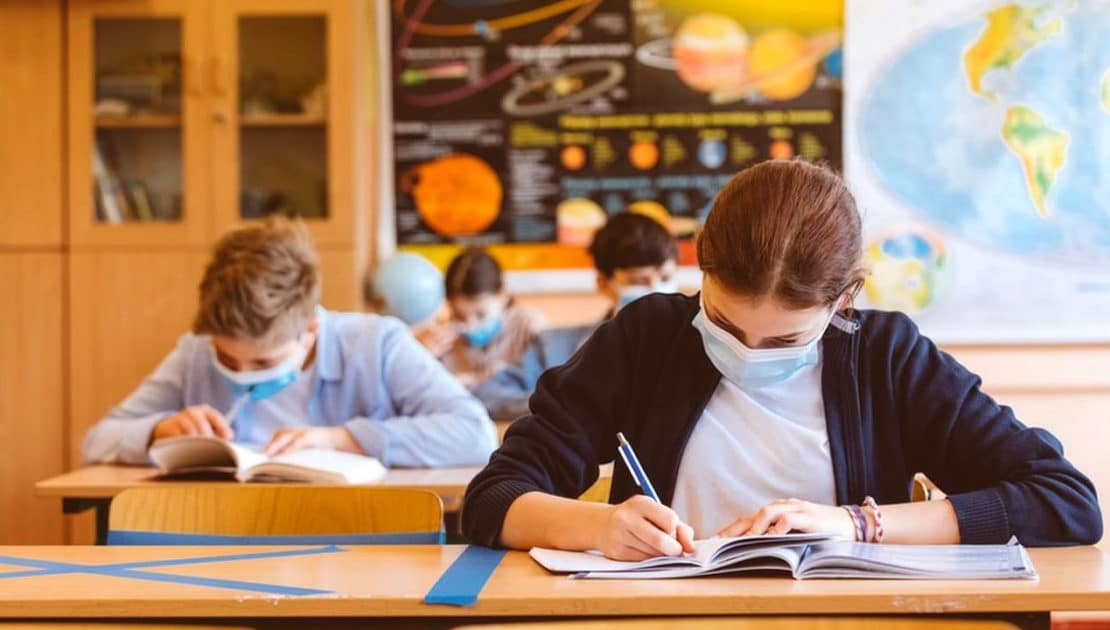While COVID-19 contracted from in-person learning is low, physicians in the US and five Western nations are as divided as the public on in-person vs. virtual learning; 24% believe it unfairly exposes the wider community.
NEW YORK, NY, December 16, 2020—As rising COVID-19 incidence cause schools to shift to virtual learning instead of face-to-face classes, new data show that six out of 10 physicians worldwide say they already do, or would, send their own children or teens to an in-person learning environment in their community. While 56% of doctors believe it is imperative for children and adolescents to gain the developmental and social skills achieved through in-person learning at this point in the pandemic, physicians remain divided on most aspects of the risks and benefits of in-person learning versus virtual learning.
Respondents were pediatricians or general practitioners (GPs) in six countries including the US, UK, France, Germany, Italy, and Spain. Findings were sourced by SurveyHealthcareGlobus (SHG), the global market leader of first-party healthcare data collection and custom survey solutions and part of the Apollo Intelligence family.
“Every nation is rightly concerned about the welfare of its children in the pandemic, and physicians agree that there are no easy answers to balancing the educational, mental, emotional, and behavioral impact of virtual learning with the health risks of contracting COVID-19 from in-person classes,” said Daniel S. Fitzgerald, CEO of Apollo Intelligence, parent to SHG. “With weekly patient wellness visits remaining as much as 50% down in certain countries from pre-pandemic levels, the upcoming holiday season may test both families and physicians. We’ll continue to share the voice of global healthcare professionals as communities re-evaluate the best path forward for their children.”
SHG’s global study found that the actual number of youth patients infected with COVID-19 since returning to in-person learning is low across all nations, with only 11 cases reported by the US doctors surveyed, 28 cases in the UK—the highest nation in the report—and seven cases in Germany, the lowest nation represented. Some respondents proactively cited the benefits of in-person school in verbatim remarks.
“Going to physical school helps the mental health because of social interactions that happen, and physical health with the physical activity that happens. If your child is healthy, they can better fight viruses including COVID and the Flu.” —American physician
Slightly over half (56%) of respondents say it is imperative for children and adolescents to return to in-person learning for proper social development. Yet 24% of physicians feel it’s unfair to unnecessarily expose teachers, other school staff, and the wider community to COVID-19 with in-person learning at this point in the pandemic. Pediatricians in Italy and Spain were the most concerned about the risks of catching COVID-19 from in-person learning, compared to other nations, advocating more for virtual learning.
Pediatricians report the challenges to virtual learning fairly consistently across the different countries, with most observing heightened screen and digital device time, reduced physical activity, and insufficient nutrition in patients. However, verbatim responses suggest rising community caseloads and school safety precautions are important barometers as well.
“I do suggest best to keep [your] child at home until numbers are decreasing for a stable time period. Schools are not adequately prepared to deal with logistics and lack the infrastructure to maintain social distancing and adequate ventilation.” —American Physician
“I assess the risk, the child’s family situation, the socio-economic repercussions depending on the type of care, and the accessibility to virtual lessons, and we make a decision.” —French Physician
Another global COVID-19 virtual vs. in-person learning findings include:
- Weekly wellness visits are down across the board—by 29% in the US, down by as much as 50% in the UK, Spain, and Italy.
- On average, American pediatricians carry the highest patient load (1,388), hundreds of more patients than their European counterparts. Spanish pediatricians have the lowest average number of patients under their care (177).
- US respondents are nearly unanimous in their observations of rising COVID-19 cases, with 97% of US pediatricians reporting the number of COVID-19 cases is increasing, and 61% believing it is rapidly increasing.
SHG’s Global COVID-19 Virtual vs. In-person Learning Report included perceptions from n=389 pediatricians or GPs in the US (n=100), UK (n=37), France (n=68), Germany (n=69), Italy (n=60), and Spain (n=55), each of whom had patients with in-person learning at least one day per week. The ten-minute online survey was fielded between November 2-13, 2020. For the complete findings, please download the full report.
About SurveyHealthcareGlobus
SurveyHealthcareGlobus, an Apollo Intelligence brand, has been providing access to physicians, allied healthcare professionals, payers, decision makers, and key opinion leaders worldwide for more than 15 years. It provides project management, sample access, and custom survey solutions to a variety of market research firms, management consulting firms, big data companies, and a variety of other users of healthcare data collection. For more information, visit www.surveyhealthcareglobus.com.
Contacts
Meghan Oates-Zalesky
Senior Vice President of Marketing
Meghan.Oates@apollointelligencecorp.com
617-934-1600
Mary Kae Marinac
PR Representative for Apollo
mk@mkmarinac.com
978-685-3136

